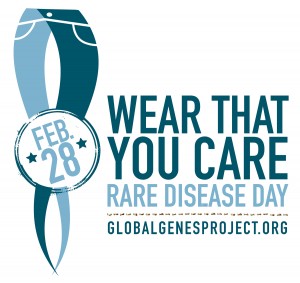 Last month, I shared my idea for creating awareness here in Vegas for World Rare Disease Day. It was to have Ethan and Abigail’s school to wear jeans on 2/28 in recognition for Jeans for Genes day.
Last month, I shared my idea for creating awareness here in Vegas for World Rare Disease Day. It was to have Ethan and Abigail’s school to wear jeans on 2/28 in recognition for Jeans for Genes day.
I asked a friend for help on how to begin this, and with her help, it has become bigger and more exciting than I could have ever hoped for!
Not only has the principal agreed to let us send out a flyer encouraging the students and staff to wear jeans on 2/25 (school is closed 2/28), but they are going to allow the entire 3rd, 4th, and 5th grade students to create bracelets for the Children’s Rare Disease Network’s 7000-bracelet project! Can you picture 350 or so elementary students creating bracelets to share their hope for children like Hannah who have been diagnosed with rare diseases?
 What is even more exciting is that the Las Vegas Bead Society has offered to volunteer their time and help getting us the beads and bracelet supplies for this event as well as offering volunteers to be in the classrooms to help make the bracelets.
What is even more exciting is that the Las Vegas Bead Society has offered to volunteer their time and help getting us the beads and bracelet supplies for this event as well as offering volunteers to be in the classrooms to help make the bracelets.
The only ‘not sure’ we have right now is whether or not the school principal will allow media coverage for this exciting day. I’m keeping my fingers crossed that she will, as it will tie in great with another event that I have in the works (will share later!). But even if she feels it is not a good idea (students come first), just the fact that she is willing to open up the school to help create this kind of awareness for childhood rare diseases is more than I could have ever hoped for.
Next step is to get a flyer to the principal for approval. Then we will know exactly how to plan out this event!
 World Rare Disease Day 2010 will be held on February 28. Please join the
World Rare Disease Day 2010 will be held on February 28. Please join the 

Latest Comments